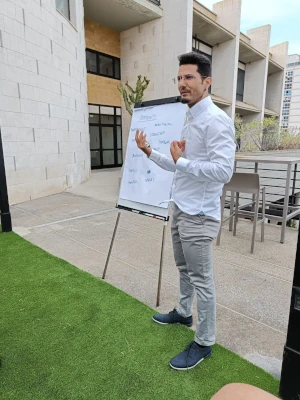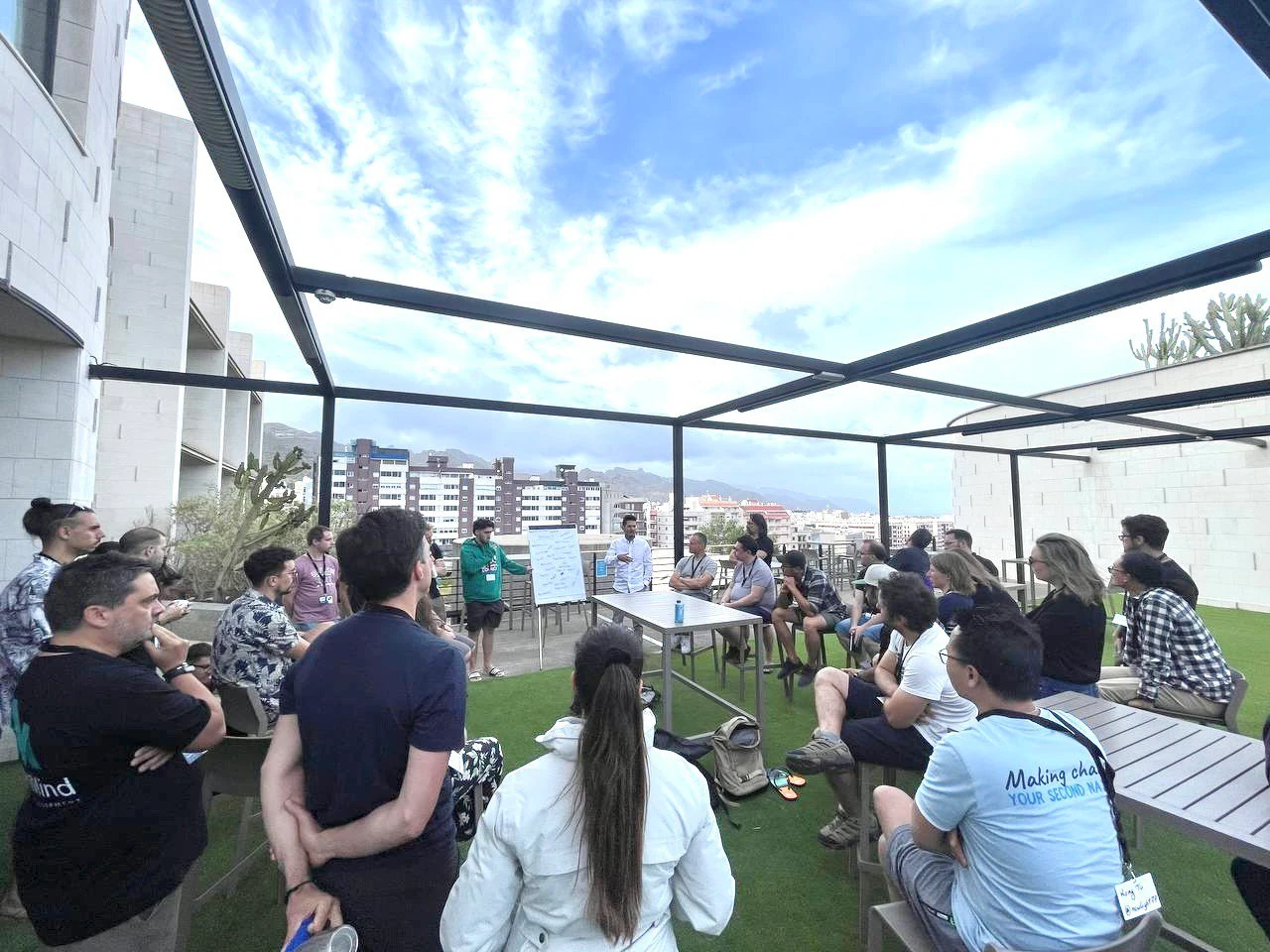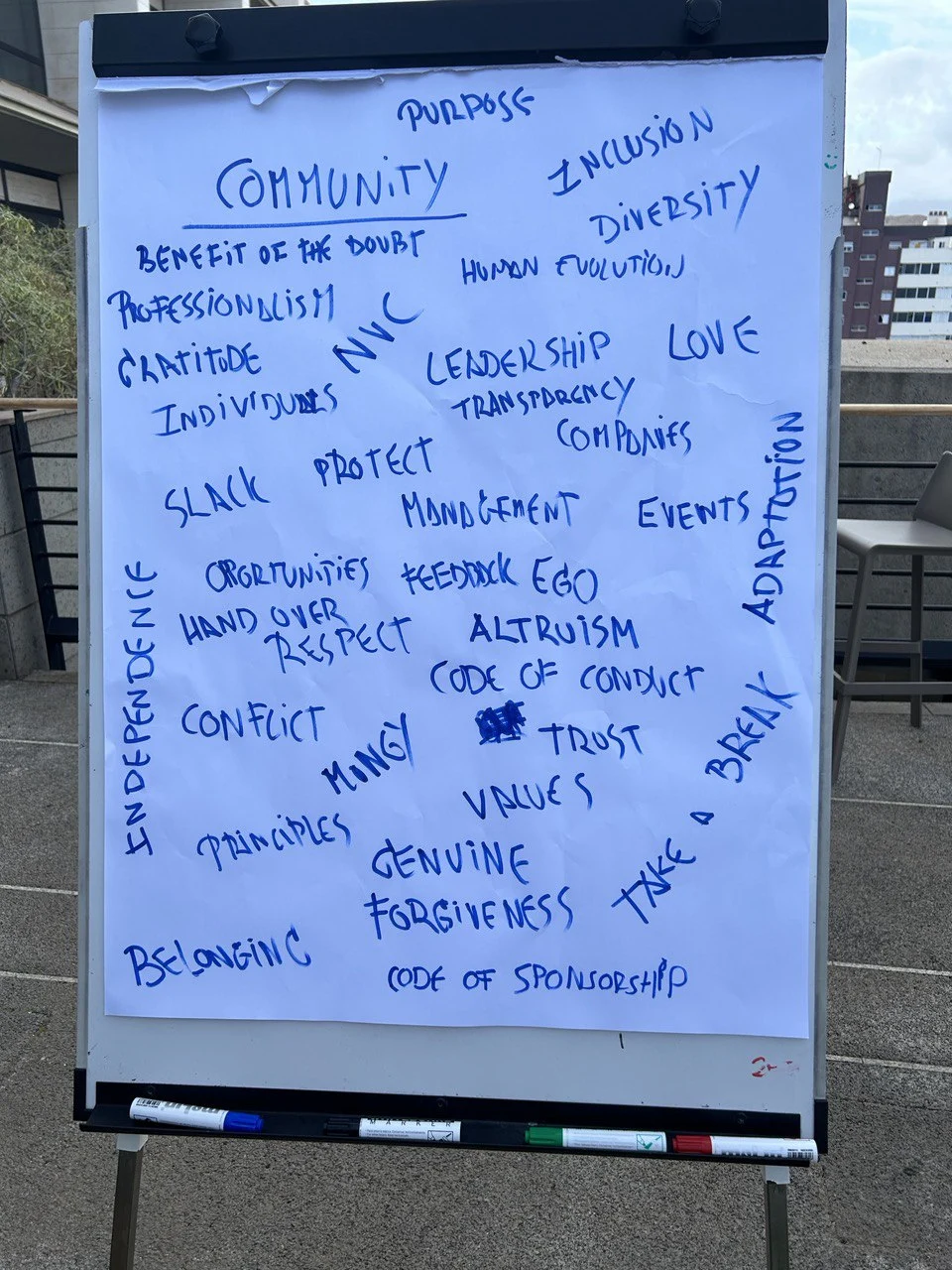The value of the community
26-06-2023
The professional community plays a crucial role in the development of our industry. During Socrates Canaries 2023 (Socracan), we hosted a discussion on what constitutes a healthy community. What are the values of the community we want, what are the various actors involved and what's their expected contribution.

In the software crafters movement, the community is key. That is the main reason why Socrates Conference started, in the first place.
According to the dictionary, the community are people considered as a unit because of their common interests, or social group. As a software developer, my community is composed of IT professionals. Within my community, I distinguish three main groups: software crafters, agilists and technologists. Agilists and software crafters could be the same group, there is certainly a lot of overlap between them, but the first group is leaning towards management and non-software related activities, whilst the second is centered on software development and the people crafting it. On the other hand, I consider technologists the people who fall in love with programming languages and tools, often passionate about the most modern technologies available. The community may be just local, national or international. I like to think of the software crafters community as an international community, striving to develop better tools for humanity.
The community is not owned by a single individual or entity. In fact, there is no owner. There is no boss. There are leaders, freely chosen by community members, without any official credential or role as leader. A community member is a person who cares about other community members and participate in community activities. There is no official community member certificate. There may be associations, entities with legal representation and some member fee, but that is a subgroup of the broader community. Associations are useful and necessary to handle invoices for certain activities, to pay for a venue, to buy stuff, to pay for professional services... What we love about the associations supporting communities is that they are altruist and lack commercial interest. Often, the people taking care of the association are generous and responsible stewards for the community.
It is common to mistake the community for a particular event. Events such as meetups or conferences are just one concrete activity hosted by the community. The community goes beyond one particular event. SoCraTes is not the software crafters community, but a gathering, an expression of the community. The fact that some event operates with certain rules, does not mean the same rules apply to other forums.

Community's number one enemy is the ego. Bloated egos, often coming from people/organisations greedy for recognition and compliments. Whenever there is somebody or some entity wanting to own the community, there is a problem. Even in the case of community events organised by a particular person, company, or association, there is no owner or boss. The organisers take care of the community, not control of it. The role of the organisers is to facilitate, to help co-create the conditions for the good interactions to happen.
--- "Wait a minute, but you are talking about community from a corporate blog, is this not counterintuitive?"
From my point of view, organisations are an important part of the community. Companies like ours:
- Encourage personnel to attend to community events during working hours.
- Sponsor/organise community events without any explicit commercial spirit.
- Support and encourage people to present at events.
- Help spread the word, reaching to other companies for sponsorship.
- Influence other companies on the importance of sharing and learning beyond their organisation.
- Lead the corporate social responsibility by example, demonstrating a growth mindset and healthy relationships inwards and outwards.
- Contribute to the diversity of the community.
- Provide interesting job opportunities.
Businesses have an enormous potential to support the community.
On the other hand, businesses benefit from their participation in the community, in many ways:
- Increasing their people's motivation.
- Training their people.
- Attracting talent.
- Gaining reputation.
- Networking - real networking.
- Innovating - by bouncing ideas, co-creating solutions.
- Partnering with like-minded professionals.
During Socracan, we agreed that not every business should be part of the community, and not all attitudes are welcome. We don't like it when businesses goals are:
- Reputation laundry.
- Woke-washing.
- Selling their product or service, not caring about the community.
- Project their ego.
- Foster unhealthy competition - pretend they are better than anyone else.
Tony Bruce suggested that, in the case of community events, there could be a code of sponsorship, so that companies are truly supportive rather than manipulative.

The picture above contains some of the ideas that came out of our brainstorming/discussion session:
- Purpose: there must be a good reason for a community to exist.
- Values: community members share a set of values.
- Belonging: the sense of belonging make a community strong.
- Professionalism: our aim is to be better profesionals.
- Independence: the community should not rely exclusively on subsidies or sponsorship, to survive.
- Gratitude: we love grateful people.
- Diversity and inclusion: whoever is willing to share and learn, is welcome. We love different perspectives and narratives.
- Non-violent communication: what a great tool for communication with fellow members.
- Transparency: let's communicate frequently, plan together, and be honest with each other.
- Trust: Believe in people.
- Leadership: lead by example, help other grow, take care of the community.
- Benefit of the doubt: in case of conflict, think that others are doing their best for the community.
- Altruism: the main driver should be love, not entitlement.
- Conflict: dealing with conflict makes us grow.
- Take a break: event organisers and community leaders should take a break from time to time, encouraging younger members to take over
- Events: gatherings are an important instrument to build a healthy community.
- Opportunities: the community should bring growth opportunities to people.
- Forgiveness: we all make mistakes. People change over time. We believe in people's change.
- Ego: sick ego is the enemy of prosperity. Do not expect accolades.
- Feedback: the community is a live organism, we give and receive feedback to improve over time.
- Management: management is required to run events, not to run the community.
- Companies and associations are a valuable part of the community.
I am very grateful to all the people who participated in this great session. If you were there and have pictures of the group or more ideas, please send them to us and we will update this article.
